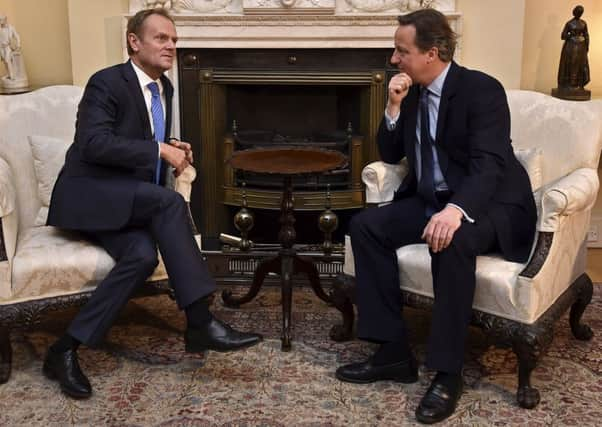Powers back to Britain '˜within grasp'


On the first official day of selling the charms of his EU deal in the House of Commons, Mr Cameron set out how he has achieved more for the country on the EU than any other Prime Minister by committing to members that his reforms will be legally binding and not reversible.
He said: “I have heard about the Maastricht treaty, about the Lisbon treaty, about the Nice treaty and about the Amsterdam treaty, but I have never seen a Prime Minister standing at this Dispatch Box with a unilaterally achieved declaration of bringing powers back to our country.
Advertisement
Hide AdAdvertisement
Hide Ad“That is what we have got. That is what is within our grasp.”
Despite concern that proposals made by the President of the EU Council, Donald Tusk, on Britain’s future place in the EU could be over-turned, the Prime Minister said he was confident that plans would be binding, and batted away the handful of expected challenges from Eurosceptic MPs.
He said: “If this document is agreed, it would be an international law decision and, as an international law decision, the European Court of Justice has to take it into account.”
He added that Denmark negotiated the same sort of legal opt outs 23-years-ago, and they are still legally binding today, while former Attorney General Dominic Grieve described the document as ‘remarkable’ as treaties have in the past proven weak.
Advertisement
Hide AdAdvertisement
Hide AdThe Prime Minister’s relative plane sailing in his first test in front of MPs during a question session was tempered last night by the Vote Leave campaign announcing a dramatic reshuffle of its leadership.
Board member Dominic Cummings, who sparked controversy in November 2015 by promising a no holds barred campaign strategy over social media has been removed, and former Conservative Chancellor Nigel Lawson will be chairmain.
Buoyed by the Home Secretary Theresa May indicating she may back Mr Cameron’s case to remain in Europe, the Prime Minister said he was confident that the negotiated terms offered a good deal for the country.
He pledged that he would ensure British sovereignty over EU law with a raft of new legislation if it was needed after a challenge by London Mayor Boris Johnson.
Advertisement
Hide AdAdvertisement
Hide AdThe Conservative MP had said he needed assurance on how the PM would restrict the ‘volume of legislation’ coming from Brussels.
Mr Cameron also said he was confident that the emergency brake applied to migrants claiming in-work benefits could begin relatively soon after the referendum and Britain met the tests required by Europe to roll it out.
There had been concerns that it could be up to 18 months and Eurosceptic MP Dr Liam Fox said the emergency brake was ultimately a decision for the EU and not Britain, and it was wrong to believe the country would be in control.
Rumblings of discontent continue too over the strength of the ‘red card’ system which would block EU legislation from affecting British law if member states agree.
Advertisement
Hide AdAdvertisement
Hide AdAmong the Conservative backbench MPs setting out the case for Britain to leave the EU in the House of Commons was Philip Davies, MP for Shipley.
Wearing a navy and lime green tie to signal his support for the Brexit Grassroots Out campaign, he made the case that Britain was more than capable of surviving outside the EU, and would save tax payers a considerable sum of money by not paying the effective £19bn ‘membership fee’.
Mr Davies said David Cameron ‘certainly fancies himself as a negotiator’ and should try to establish a free trade agreement from outside of the EU, to save on the union’s significant cost to the British public.
Mr Cameron said he had “great respect” for the Shipley MP but feared he “wanted to leave the EU whatever came out of these negotiations.”
Advertisement
Hide AdAdvertisement
Hide AdThere will next be a full day debate in the House of Commons on the proposed deal before European member states meet to decide on whether to agree to Britain’s reforms at the end of the month.
AN EARLY summer referendum on Britain’s membership of the EU on June 23 is looking increasingly likely after the Prime Minister dismissed nationalist demands to wait.
Scotland, Wales and Northern Ireland’s first ministers have called for a commitment from the Prime Minister not to hold the EU elections close to the devolved legislature elections on May 5 as it ‘risks confusing issues when clarity is required’.
However Mr Cameron said he would respect laws in place that mean there must be a six week gap between the two elections but people in the devolved nations are more than capable of voting in two elections in close proximity.